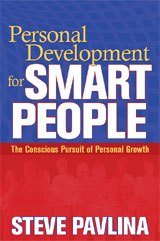With a name like Personal Development for Smart People, I have to admit I was expecting something a little more technical than what Pavlina wrote. I was expecting a system, maybe a few worksheets and some definitive steps that Pavlina might recommend to readers. If you’re looking for a how-to guide, however, Personal Development for Smart People isn’t going to meet your needs.
Rather than producing a user’s manual for personal development, Pavlina created something more philosophical, more theoretical. His book provides a basic framework from where all other parts of finding a workable system, be it for productivity or careers or something else entirely. It works as such and can provide a good introduction to underlying principles. I think, at least in part, Pavlina’s approach is a reflection of how he came to the topic of personal development. In the introduction to the book, he relates the moment when he decided he needed to straighten out his life — he was 19 years old and in jail. He decided he needed to start from the ground up, down to the point where he needed a new code of ethics. I doubt Personal Development for Smart People could have been written by any personal development expert who came to the field needing to solve just one problem or answer just one question. On a fundamental level, Personal Development for Smart People really is about building from only starting principles.
Consider the first half of the book’s table of contents:
These are the topics that Pavlina considers fundamental, and after reading his book, I think I agree. Consider the issues we’re always looking to tweak: our careers, relationships and other fairly surface issues. Pavlina set out to find commonality between all these problems we run into, on the grounds that there must be fairly universal approaches that could work across the boundaries between career and relationships. Pavlina’s criteria were simple:
That’s a pretty tall order, but Pavlina managed to find three principles that fit the bill: truth, love and power. The other four (oneness, authority, courage, and intelligence) are secondary principles derived from those three. It isn’t a stretch to consider most of our questions about personal development in those terms: I know a lot of my own productivity pitfalls have amounted to whether I was really being truthful with myself from goals to my own capabilities.
Pavlina didn’t really let me down when it comes to concrete advice on developing parts of my life, despite dedicating the first half of Personal Development for Smart People to a broader over view. The second half is the “Practical Applications” section and I did find plenty more to chew on in the second section. Pavlina really puts the theoretical concepts he discusses in the first section to work when describing his principles’ practical application. Chapter 7 particularly stuck with me: it covers habits, starting with their connection to truth and leading through love and power. With truth, Pavlina suggests a few moments of brutal honesty:
Pavlina is suggesting a very difficult conversation to have with yourself, and his approach to handling your habits doesn’t get any easier. When he looks at habits through the lens of love, he has equally tough ideas — including removing connections to friends that make it harder to break your addiction. Nobody ever said that personal development was easy, however. Beyond connecting his discussion of habits to principles, Pavlina does cover some helpful hints on actually breaking negative habits and creating positive ones, such as 30-day trials and stair-stepping. From there, Pavlina dives back into his principles and covers how habits interact with the secondary principles, such as oneness and authority. He does the same with Career, Money, Health, Relationships and Spirituality.
I don’t know if Personal Development for Smart People is going to be a game-changing book as far as personal development goes. While it is packed with good information, it has a ground-up approach that may not work for everyone. So many people are looking for help with just their careers or just their relationships that it seems not everyone is ready for such a broadly-based book. But for those individuals who are ready to tackle some dramatic changes — especially those interested in starting from scratch — Personal Development for Smart People really could be the right fit. On that note, I recommend adding Personal Development for Smart People to your reading list.
